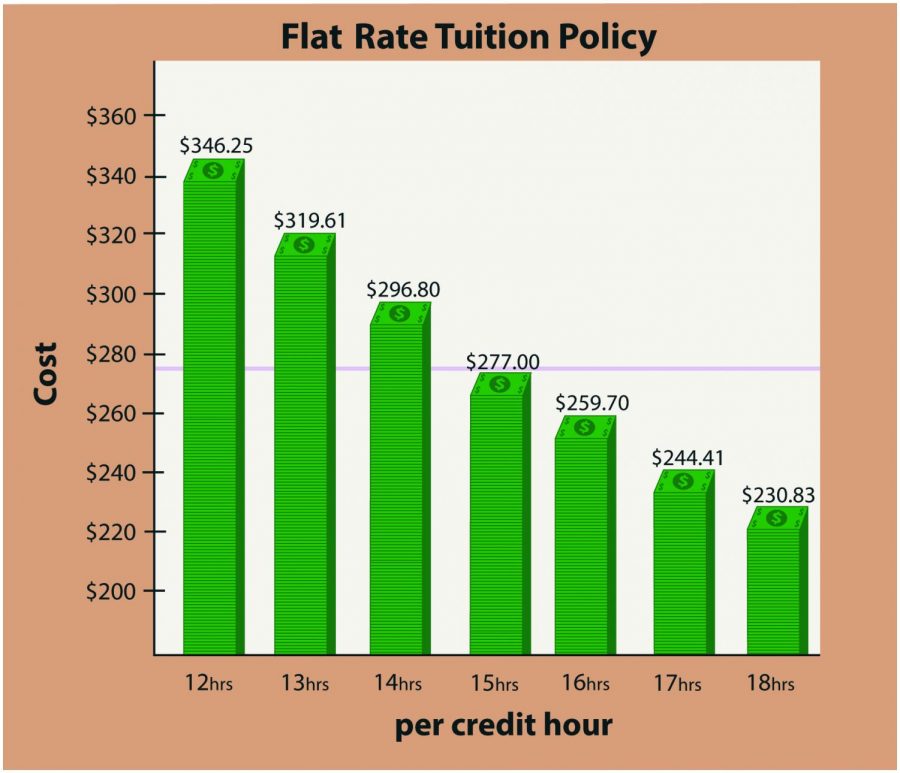New tuition policy could be ‘double-edged sword’ for students
August 23, 2018
UNA transitioned from a pay-per-hour tuition system to a “banded system” where students will pay a flat rate of $4,155 if they are enrolled full-time beginning this fall.
The new system charges full-time students taking between 12 and 18 credit hours a flat rate. The rate is based on the current cost of a 15 credit hour semester.
Students who take less than 12 credit hours will continue to pay the per credit hour rate.
UNA President Kenneth Kitts said the change in tuition is meant to encourage students to take on the appropriate course load necessary to graduate in four years.
“Due to the success of Project 208 this past spring coupled with careful budget planning, we believe we can navigate this change without a tuition increase for academic year 2018-19,” Kitts said. “Other universities have employed this system with success, including Auburn University, the University of Alabama and several of the regional campuses in our state.”
The university held an open forum to discuss the changes on June 4.
Student reaction to the new policy has been polarized. Some students benefit, while other students face unnecessary costs. Others were unaware of the new policy, and they think the university could have been more open and transparent with the policy.
Student Government Association President Chase Holcomb said administrators told SGA the policy was moving forward, but they were never consulted.
“The new tuition policy affects me the same,” Holcomb said. “I’m taking 15 hours every semester until I graduate.”
Senior Samuel Mashburn said the new policy will help him graduate with two degrees instead of one for less money.
“The new tuition model is going to help me make the most out of my four years at UNA. Before, I was on pace to finish in four years with one major taking 12 hours a semester,” Mashburn said. “Now with the new model, I can graduate at the same time with a double major, and not pay any more than I would for my first major.”
Junior Katie Liggin said the new policy could be a double-edged sword.
“On one hand, it’s helpful to know that your tuition costs won’t be rising because of the number of classes you take,” Liggin said. “However, the few students who choose to take 12-13 hours out of fear of overwhelming themselves could leave them in a position to spend more money than intended.”
Junior Miller Pelton said the pace of a student’s time in college should not be dictated by the university.
“Since students are the ones playing for school, we should be able to choose the pace that we take courses,” Pelton said. “Some students can’t afford to take more than 12 hours a semester, so it’s unfair to force them to pay for more hours.”
Miller said if the university wants to build trust with students, there should at least be an adequate heads up.
“This isn’t the first policy that has had suspicious timing and makes the university look pretty greedy,” Pelton said.
Junior Caleb Hines said the university could have done a better job communicating the new policy to students.
“I don’t think I would like it, and I really don’t know much about it” Hines said. “I have to work a lot. Usually, I take 12 hours a semester.”
Senior Rachel Shockey said she understands why the university would implement a policy like the new one, but she wishes juniors and seniors had a choice to opt-out of the policy.
“Why don’t they allow students to choose their own pace?” Shockey asked. “Some students might have a family situation or work a lot.”
Shockey said she did not hear about the policy, and the university could have definitely communicated with students more efficiently.
Senior Steven Tyler said it feels like the university is saying “we are going to take yall’s money and not tell you about it.”
“I’m taking 12 hours this semester, so I am not ok with it,” Tyler said. “If I am not taking that amount, then I shouldn’t have to spend my money on it. They should have introduced the policy at the beginning of the semester. Not implement, simply just informing people about the policy and the change.”
Interim Vice President of Student Affairs Kimberly Greenway said she believes the university would only implement a policy that immediately benefits most students.
“One of the biggest growing pains the university will face during the transition to Division I is funding,” Greenway said. “Whenever the state decides to go to performance-based funding, the university will be better prepared for it.”
Greenway said one of the elements the state will take in consideration for funding is graduation rates.
She said it is important the university puts policies in place to help increase graduation rates.
Vice President of Academic Affairs and Provost Ross Alexander said the policy encourages students to take the 15 hour minimum per semester to graduate in four years.
“The best case scenario is for students to graduate in four years with a Bachelor’s degree or in five years with a Master’s degree,” Alexander said.


